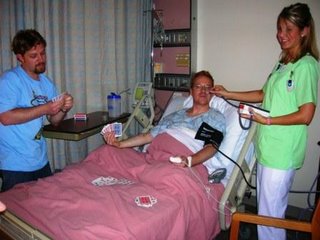If I wasn’t having a baby I’d probably be talking about Hamlet non-stop. As it is, it’s hard to think about anything besides the Sesame Seed. Here’s my attempt to write a non-baby-related post.
The in-laws flew into Boston yesterday, my mom arrives this morning, and her friend and my dad fly in tomorrow. It’s a gaggle of people, and a major part of their agenda is to see Hamlet.
I love my mother’s enthusiasm for my career—I’m fairly certain she feels earth-shattering regret every time she misses one of my performances, whether it’s some silly staged-reading or me sneezing on camera. But that’s what moms are for, right? My dad’s very supportive too, but he doesn’t have the ovaries tugging on him like my mother. Thom’s parents also great about my career and made it out two years ago to see my first Boston play.
I know it’s not the only reason they’re here, but it does add a bit of pressure to know that the catalyst for their visit was my play. What if they hate it? What if they walk away thinking, “I flew 5,000 miles for that?” I know that’s a bit extreme, but I do have some anxiety around this performance. First of all, this production can really only barely be called Hamlet. We use some of the text, but that’s about the limit of our faithfulness to the play.
I really had no idea what I was walking into when I agreed to do this show. My friend Shawn, the director of Hal Harry Henry, asked me to be a part of a small workshop production of Hamlet some months ago. He said he had tweaked the text a bit—which I expected based on my last experience with him. I was willing to try something different with Shakespeare, especially if it meant playing Ophelia (a role I’m always disappointed to see portrayed as a weepy, wimpy, cuckoo waif). Shawn wouldn’t be directing this time, instead enlisting the help of a founding member of Shakespeare and Company, John Hadden. Sounded great.
Well, a week before rehearsals we didn’t have a script (which usually wouldn’t be a problem with Shakespeare—you can just count on learning certain lines—but not so for this production). Then a few days before we were to start working Shawn said his script had been thrown out and John was talking about something called Hamlet: A Dream Play. Here’s where I got nervous. What does that mean? Don’t dreams inherently mean low stakes? What audience is going to sit through someone else’s dream?
But I showed up to rehearsal with an open mind. I trusted Shawn and his faith in John, I knew—and loved—the rest of the cast, and I was willing to try something outside my comfort zone. The rehearsal process was rocky for me. It was exciting to see that we were doing things no one else does with Shakespeare (inserting our own text into the play, giving Hamlet’s lines to everyone besides Hamlet, completely disregarding plot or story), but a nagging part of me kept thinking, There’s a reason no one else does this with Shakespeare. Eventually, I just let that nagging part of me go and made up my mind to do the best damn Hamlet Dream Play I could do.
The result of our whirlwind rehearsal period is something I’m very proud of. It’s more experimental and challenging than anything I’ve ever done, and if you come to it with an open mind, I think you can see a really beautiful, unexpected piece of art. If you’re a more conventional theatre-goer, it might just drive you nuts.
Which brings me back to my guests. I know that my family loves me and they’re always going to be supportive of what I do. But I don’t know how they’ll feel about this play. Often I walk off stage and I don’t know how I feel about it. It’s still very challenging for me and so strange that I don’t know if what I’ve just done was any good or not.
I guess when it comes to my parents I’ll always be a little girl—waving at them from the stage, bursting with hope that they’ll be proud of me.
The Giving Gloop
19 hours ago










